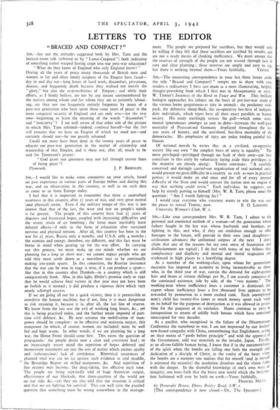SIR,—The interesting correspondence in your last three issues under the
title "Braced and Compact? " tempts me to share with yow readers a rediscovery I have just matte oi a most illuminating, helpful, thought-provoking book whith I first met in Mesopotamia in 1915: W. Trotter's Instincts of the Herd in Peace and Wat. This brilliant biologist approaches his subject on the basis of pre-last-war study of the various forms gregariousw-zss take in animals: the predatory wolf- pack, the defensive sheep-flock, the co-operative bee-hive of indepen- dent individuals, which types have all their exact parallels in human society. His study startlingly reveals the gulf—which some senti- mental ignoramuses amongst us seek to deny—between the wolf-pack mentality of Prussianised Germany displayed throughout the last zoo years of history, and the socialised, bee-hive mentality of the democracies. His prophecies of 1915 are today finding painful ful- filment.
Of national morale he writes that in a civilised, co-operative society like our own "the simplest basis of unity is equality." The more privileged—privileged through no fault of their own—can best contribute to this unity by voluntarily laying aside their privileges (as the majority are already doing). Trotter contmues "A carefully conceived and daringly carried-out organisation of real national unity would present no great difficulty in a country so rich as ours in practical genius; it would make an end once and for all of every internal difficulty of the State and would convert the nation into an engine of war that nothing could resist." Each individuai he suggests, can help by sternly putting to himself (Mrs. W. R. Tarn, please note) the question: "Am I worth fighting feu?"
I would urge everyone who sincerely wants to win the war and the peace to reread Trotter, now. E 0. LORIMER. University Women's Club, W. .r.


























 Previous page
Previous page